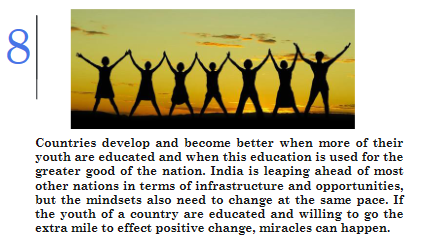Theme: Reimagining Youth Skills Post Pandemic
The United Nations General Assembly declared 15 July as World Youth Skills Day in the year 2014, to celebrate the strategic importance of equipping young people with skills for employment, decent work and entrepreneurship.
Since then, World Youth Skills Day events have provided a unique opportunity for dialogue between young people, technical and vocational education and training (TVET) institutions, firms, employers’ and workers’ organizations, policy makers and development partners. Participants have highlighted the ever-increasing significance of skills as the world is embarking on a transition towards a sustainable model of development.
Why TVET?
Education and training are central to the achievement of the 2030 Agenda. The vision of the Incheon Declaration: Education 2030 is fully captured by Sustainable Development Goal 4 “Ensure inclusive and equitable quality education and promote lifelong learning opportunities for all”. Education 2030 devotes considerable attention to technical and vocational skills development, specifically regarding access to affordable quality TVET; the acquisition of technical and vocational skills for employment, decent work and entrepreneurship; the elimination of gender disparity and ensuring access for the vulnerable.
In this context, TVET is expected to address the multiple demands of an economic, social and environmental nature by helping youth and adults develop the skills they need for employment, decent work and entrepreneurship, promoting equitable, inclusive and sustainable economic growth, and supporting transitions to green economies and environmental sustainability. In short,
- TVET can equip youth with the skills required to access the world of work, including skills for self-employment.
- TVET can also improve responsiveness to changing skill-demands by companies and communities, increase productivity and increase wage levels.
- TVET can reduce access barriers to the world of work, for example through work-based learning, and ensuring that skills gained are recognised and certified.
- TVET can also offer skills development opportunities for low-skilled people who are under- or unemployed, out of school youth and individuals not in education, employment and training.
Now, it is BILT in TVET. The Bridging Innovation and Learning in TVET (BILT) project provides TVET institutions with a platform to explore and support the process of identification and implementation of new qualifications and competencies through an ecosystem approach.
The objectives of the World Youth Skills Day 2021 are to:
- Assess the situation of young people regarding skills and work during and after the COVID-19 pandemic; learn how they have been living through the crisis; highlight success stories of youth innovation and resilience;
- Debate on prospects for skills development and the world of work as economies recover, and on the effectiveness of national recovery plans and support from development partners; and,
- Reflect on how TVET stakeholders can collaborate to scale up skills development and help reconcile the short-term need for economic recovery with the urgent need for accelerating the transition to sustainable development.
- Additionally, the Global framework on core skills for life and work in the 21st century will be launched. This new global framework reflects the ongoing transformations and the emerging opportunities in the world of work. This publication contributes to ILO’s efforts in promoting personal and professional development for all, through lifelong learning.

Significance of the WYSD 2021 theme – Reimagining Youth Skills Post Pandemic
- Young people aged 15-24 have been even more severely affected by the COVID-19 crisis than adults. Globally, youth employment fell by 8.7 per cent in 2020, compared with 3.7 per cent for adults.
- Young women have been particularly hard hit by the COVID-19 pandemic as compared to young men.
- Prior to the crisis, 22 per cent of young people were not in employment, education or training, one in seven young men and one in three young women. The decline in employment caused by the COVID-19 crisis has not been compensated by returns to education and training. Hence, the NEET rate has risen in many countries and remains higher than before the crisis.
- TVET stakeholders have been able to limit the disruption of training caused by the COVID-19 crisis. A survey of firms showed that across countries, activity sectors and firm sizes, remote training became more prevalent during the crisis, despite difficulties including poor connectivity and low levels of digital skills. Most firms indicated they would draw lessons from that experience and modify the way they deliver training to their employees after the crisis is over.
- Enterprises and organizations brought skills development almost to a standstill due to lockdown measures introduced during the pandemic. Training was interrupted for 86 percent of apprentices and 83 percent of interns/trainees. Nearly half of the enterprises have stopped paying stipend or wages to apprentices, interns and trainees.
- Looking beyond the COVID-19 crisis and recovery is essential. The youth population will grow by more than 78 million between 2021 and 2030. Low income countries will account for nearly half of that increase. Education and training systems need to respond to this challenge.
Access our E-Magazines for interesting articles, inspirational features, fun activities and lots more!



It’s a great opportunity for students
LikeLike
I understand this way
LikeLike
Sapnarajkumar74@gmail.com
LikeLike